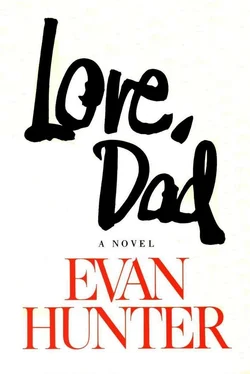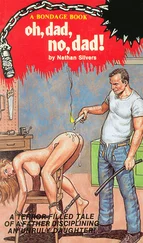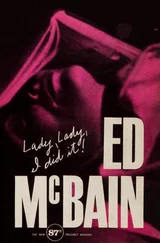“What’d she say?”
“Will you make me one, please?”
“Yes, what’d she say?”
“She’s coming home, you needn’t worry.”
“When?”
“She’ll be here for Easter.”
“I want her...”
“It doesn’t matter what you want, Jamie.”
“What?”
“It doesn’t matter anymore,” Connie said, and took the drink from his hand.
Barbara Duggan was leaving for Europe, and her apartment — in its present barren state — was furnished only with a single mattress in one of the bedrooms, a half-dozen throw-pillows on the living-room floor, and an ancient battered floor lamp, none of which Barbara had been able to sell to the steady stream of bargain hunters who’d traipsed up the stairs to the third floor all through the past month. Her duffel bag was already packed, and she had $3,000 in traveler’s checks tucked into a sock in her shoulder bag, but her final destination was still a question mark. The two boys who were crashing with her were Carnegie Tech dropouts who’d come west in search of acting careers, but who were leery about making the big move to L.A. and were using San Francisco as a sort of decompression chamber.
The five of them were sitting on the living-room floor, propped on the throw-pillows, smoking pot and drinking hot chocolate. The apartment was on a street lined with factories, and fumes from their chimneys seeped through the cracks in the old sash windows to mingle with the headier aroma of marijuana. Now and again on the street outside — this was now close to midnight, California time — a horn honked, but for the most part the night was still except for the sound of machinery in the nearby factories. Barbara had sold her record player; otherwise there might have been music. Jerry, the better looking of the two Carnegie dropouts, and therefore presumably the one with the brighter theatrical future, was telling about the cops who’d stopped them in Kansas.
“Middle of a big fucking wheatfield,” he said, “not another car in sight, we were doing — what, Michael? — fifty miles an hour?”
“Maybe sixty,” the other boy said. “Point is, we were observing the speed limit.”
“That doesn’t mean anything to them,” Barbara said.
She was wearing a brightly printed caftan, her thick black hair pulled into a knot at the back of her head, gold hoop earrings on her ears, sandals on her feet, a string of Indian beads around her neck. She was perhaps Lissie’s age, a girl with a flawless, pale, almost porcelain complexion, and slanted brown eyes that gave her a composed and somewhat inscrutable Oriental appearance. She spoke in a very low, well-modulated voice (Mom would adore her, Lissie thought), her A’ s broadened by her Bostonian upbringing, her cadences soft and lilting. Sitting beside her barefooted, in jeans and a scruffy T-shirt, Lissie felt bedraggled by contrast. She wanted nothing more than a hot bath and a good night’s sleep. She did not want to hear about the dropouts’ trials and tribulations on the road; she and Judd had suffered through enough of their own. But she stifled a yawn and listened.
“Pulled us over to the side of the road,” Jerry said.
“Siren blaring, like we’d just held up a bank,” Michael said.
“Checked out the driver’s license and the registration, then asked us to get out of the car.”
“Went over it top to bottom, looking for grass.”
“Didn’t find any, of course, we’re not that fucking dumb.”
“But they kept us at least an hour, pulled the seats out, looked through the trunk, the glove compartment, the pockets...”
“Even looked under the car, figuring we had a hundred pounds of heroin taped under...”
She’d never heard her father sound the way he had tonight. Never. You’d think she was selling herself on the street, for Christ’s sake! Well, she should have told them about Judd long before this, she guessed, but judging from tonight’s performance maybe she’d been right in delaying a confrontation. At least this had been on the phone, and it had been bad enough. Awful, in fact. She could just imagine what a face-to-face in the Rutledge living room would have been like. You’re living with a what? A boy? A boy you’re sleeping with? And then the heart attack, whammo, flat on the living room Bokhara, her mother standing by weeping.
“... even serve us in Utah,” Judd was saying. “We went into this greasy spoon, cowboys on the front porch, you know...”
“Yeah, cowboys,” Michael said.
“Judd, I’m sleepy,” Lissie said.
“Bull Durham in their shirt pockets, that little tag hanging, you know...”
“Yeah, cowboys,” Michael said again.
“Looked Lissie over head to toe, raped her with their eyes.”
“No, they didn’t,” Lissie said.
“You didn’t see them.”
“Well,” she said, and shrugged.
“We went inside to the counter,” Judd said, “and this big beefy bastard ambles over and says, ‘We don’t serve hippies.’ ”
“What’d you do?” Jerry asked.
“I told him that was against the law. He said I should first go get a haircut, and then we could discuss legalities. I told him what I was going to get was a goddamn lawyer. ”
“Did you?”
“In Brindleshit, Utah? We just kept driving till we got to Nevada. In Nevada, they served us.”
“That’s ’cause the Mafia runs Nevada,” Michael said.
“Barbara, do you think I could take a bath?” Lissie said.
“Sure, honey,” Barbara said, “provided you’ve got your own towel. I sold all mine except the one in the bathroom.”
“I’ve got one,” Lissie said.
She went to her duffel, took a towel and a bottle of shampoo from it, and followed Barbara into the bathroom, across the hall from the largest bedroom. The tub was an old-fashioned monster that reminded her of the one in the Commonwealth Avenue apartment.
“How long will you be in Frisco?” Barbara asked, turning on both water taps.
“I have to be back before Easter,” Lissie said, and yawned. “Forgive me, I’m really exhausted.”
“Well, it was a long trip,” Barbara said, nodding. “So you’ll be leaving when?”
“I don’t know the exact date, you’ll have to ask Judd.”
“When are you due back at school?”
“Not till the thirtieth.”
“Nice long break.”
“Yes, but I have to be home the day before. For Easter.”
“That doesn’t give you much time here. Easter’s only a week away.”
“We figure we can make it back in four days.”
“That’d be pushing it.”
“Judd’s a fast driver. Anyway, I promised my father.”
“He sounded apoplectic on the phone.”
“Yeah, I guess he was a little excited.”
“A little, huh? I’d hate to hear him in a rage.”
“He’s all right, though. Usually.”
“Mm,” Barbara said. “How old are you, Liss?”
“Eighteen. You?”
“I was nineteen last month. Where’d you say you were going to school?”
“Brenner. How about you?”
“I dropped out of William and Mary a year ago, in my first semester. Came west on the back seat of a motorcycle with a twerp named Percy. You should never ride a motorcycle with anyone named Percy. You should never, in fact, do anything with anyone named Percy. The Percys of the world are superior only to the Bruces of the world. Avoid both, my child, and may God bless you.” She made the sign of the cross in the air, much as the Pope might have.
“Are you Catholic?” Lissie asked.
“Used to be.”
“When did you stop being?”
“Rode to church on my bicycle — must have been eight years ago — the day before Easter, full of holy emanations. Got in the confessional, crossed myself, said ‘Bless me, father, for I have sinned, this is one year since my last confession.’ I was eleven years old, the biggest sin I had to confess was having seen myself naked in the mirror, horrors! Silence in the booth. Blackness. The priest finally said, ‘And you pick the busiest time of the year to come?’ I left the confessional, left the church, got on my bike and rode home. How about you?”
Читать дальше












